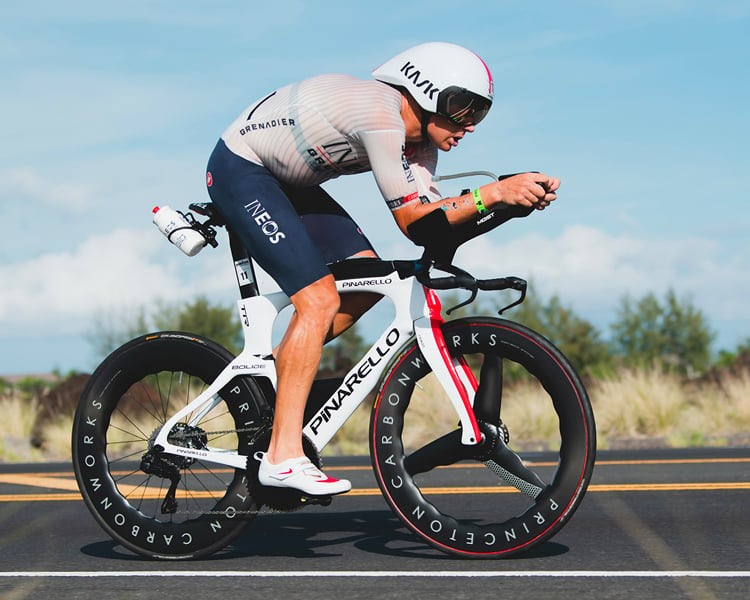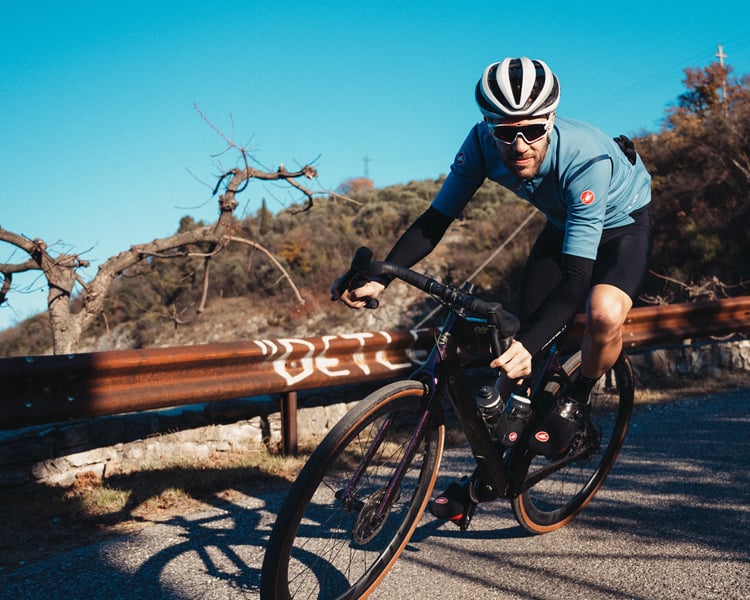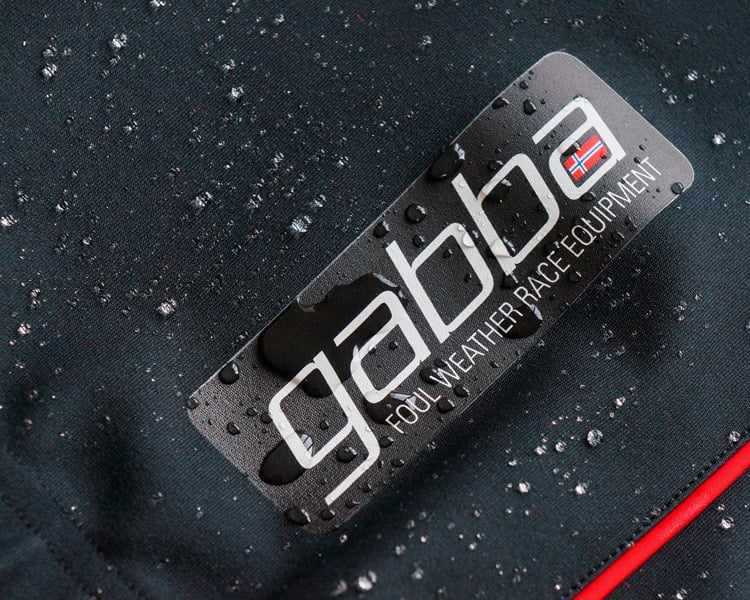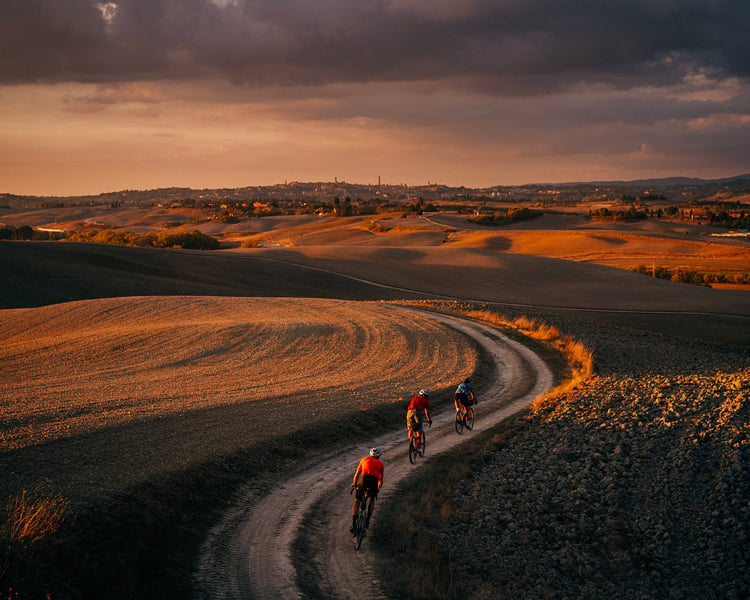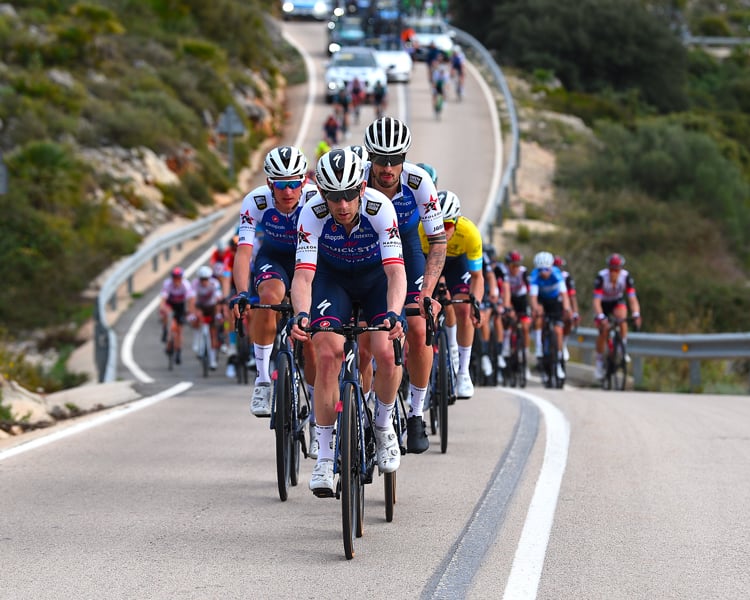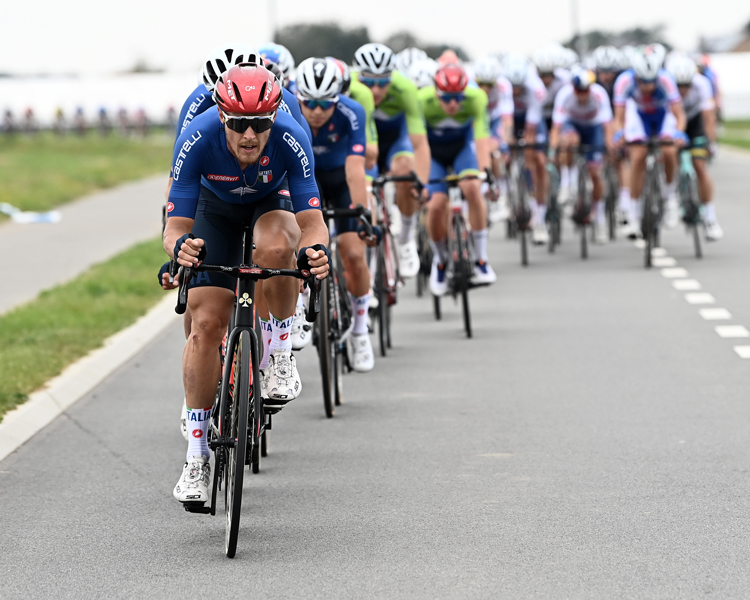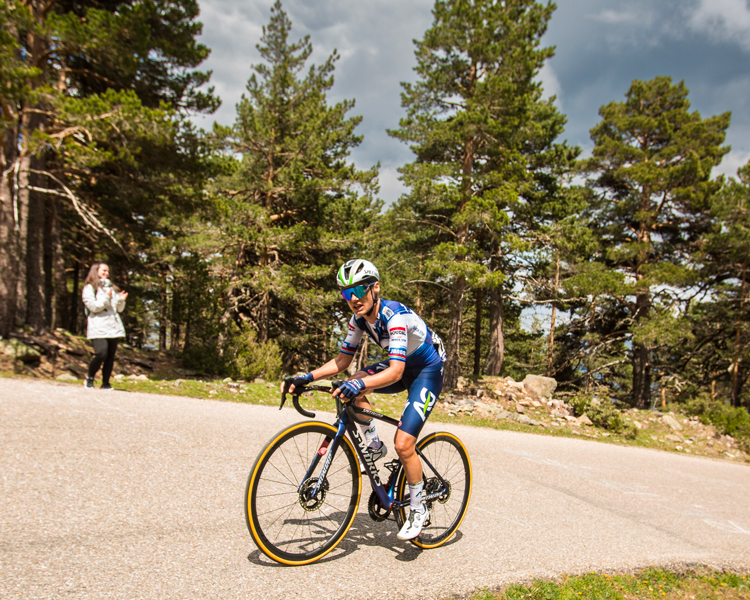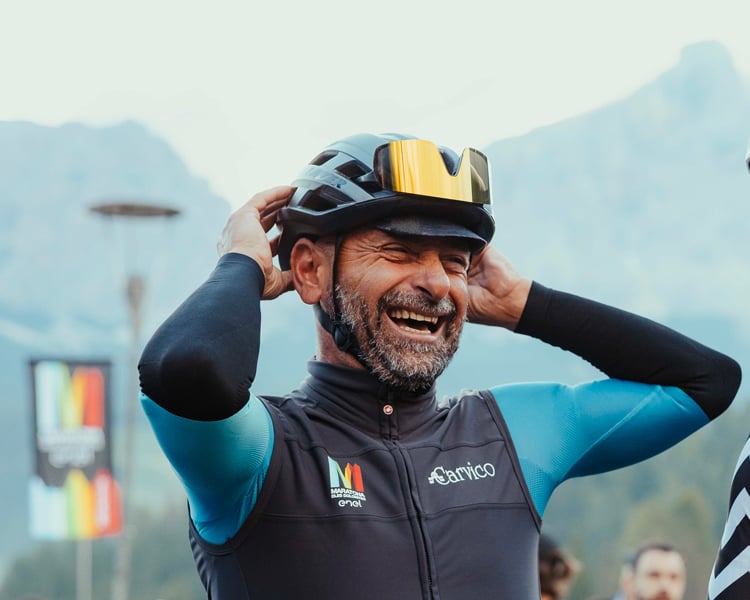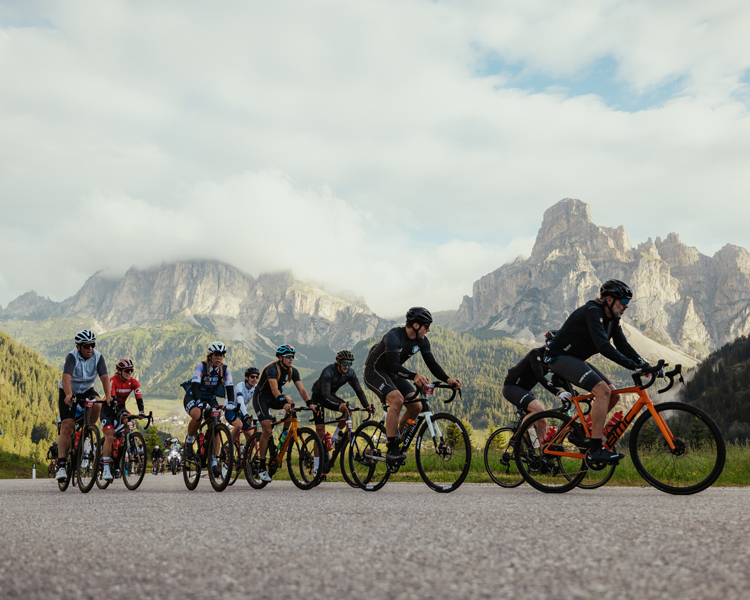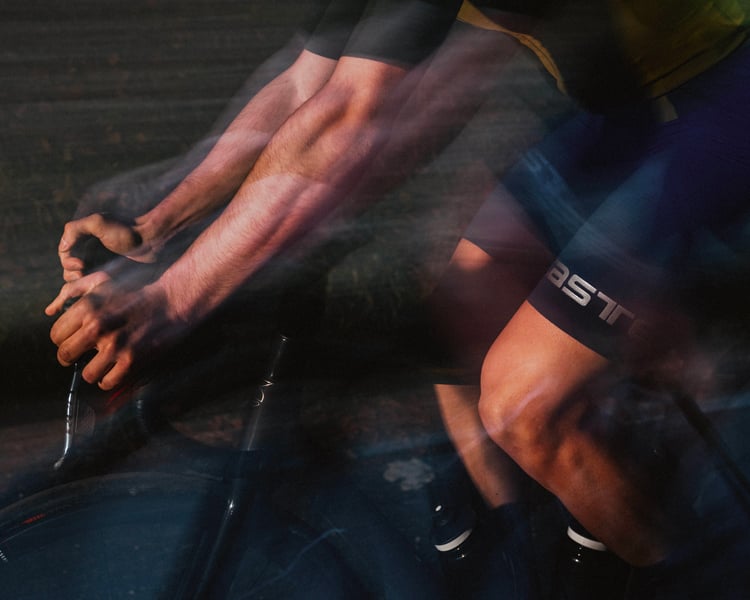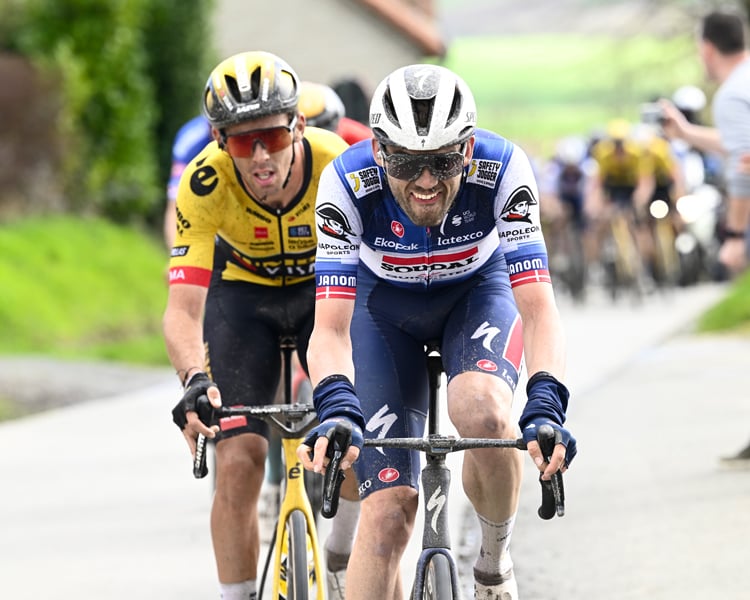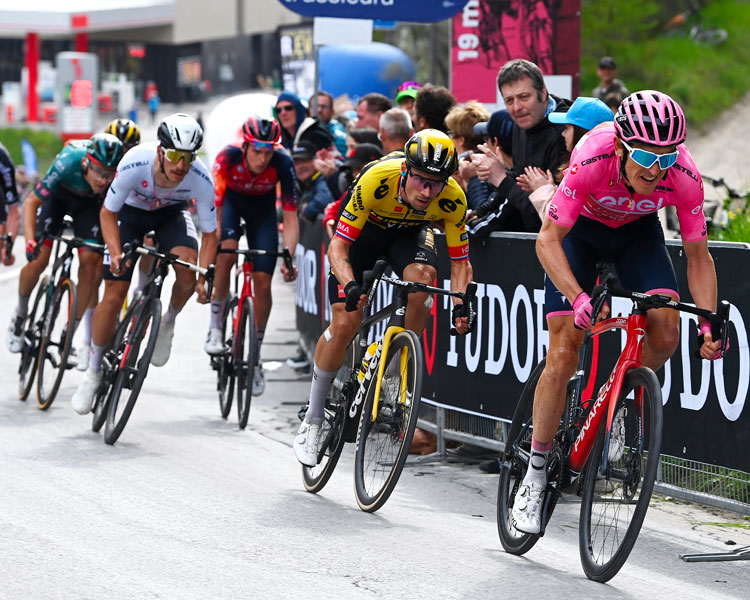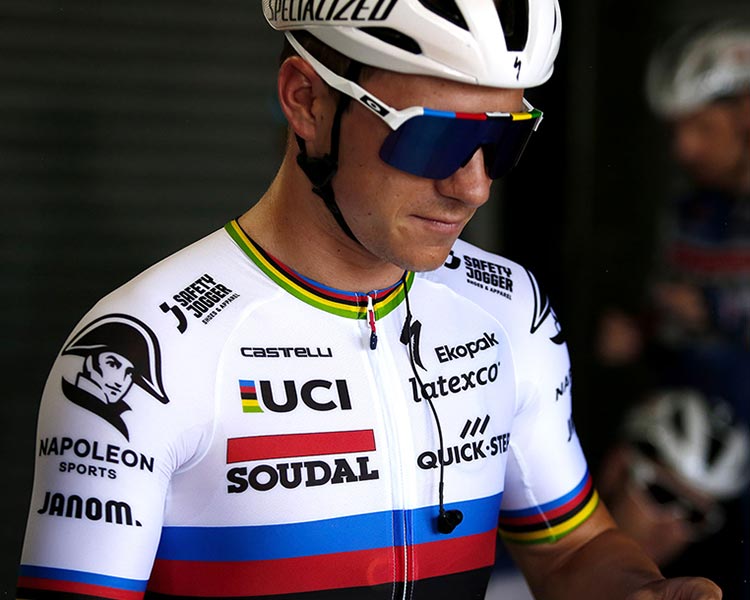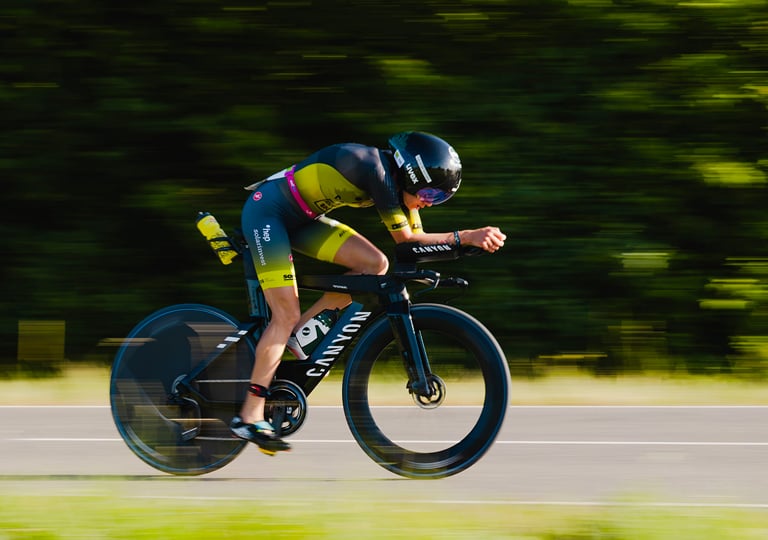
Over the past years Laura has managed to establish herself as one of the leaders of the sport not just by winning titles but also being a role model for a healthy lifestyle, a powerful motivator for many people and finally her love for cake.
Laura takes us on an in-depth, deeply honest, personal journey through her challenges and her constant search for opportunities to improve.
TOPICS COVERED & TRANSCRIPT
(00:00) Welcome
(00:55) Laura's Story into the sports
(07:10) Versatility in training and Career milestones
(11:00) Package to remain at the forefront of the sport
(13:35) Race Suit development, wind tunnel
(16:00) Watt savings over the years
(19:15) Castelli & female needs
(21:20) Laura's favorite Castelli item
(26:35) Training locations, high altitude training
(30:50) KickAss Community, Education and optimization
(37:30) Dreams, future goals, competing in other sports
(40:55) Ending
SOREN JENSEN
Welcome to the Castelli Podcast, the show that takes you behind the scenes of your favorite sport and introduces you to the characters within it. In this week's episode, our Tri-Division Manager, Bernhard Plainer is joined by one of the world's top female triathletes, Laura Philipp. Just before the top female triathletes gather in Hawaii for the historic Kona World Championship this Saturday, Bernhard had the privilege of sitting down with a remarkable German athlete for a chat about her journey to becoming one of the best in the game. She's not only a top athlete, but also a shining example of a healthy lifestyle and a powerful source of motivation for countless individuals. We hope you will enjoy this episode and please make sure to rate us and follow the show wherever you get your podcast.
BERNHARD PLAINER
Laura, first of all, thanks for taking the time to talk to me today.
I really appreciate your time during this busy period of the year. At the beginning, I would like to introduce you to our audience. Can you briefly describe yourself for all the people who don't know you that well, who don't follow triathlon on a regular basis? Can you talk a little bit about your personality, your achievements, whatever you want to add?
LAURA PHILIPP
Yes, sure. So first of all, thanks for having me.
Yeah, it's nice to talk to you here on the podcast. Usually we talk about all the Castelli equipment, racing plans and so on. So yeah, it's cool to be here. My name is Laura Philipp. I'm a professional triathlete from Germany. I'm a professional triathlete since 2016. Before that, I worked as a physiotherapist and then slowly started to have success in the sport and that allowed me to cut down my work. Then in 2016, I decided I would go all in and see what I can do as a professional athlete and focus 100% on the sport. And my way into the sport was a bit unusual, so I have no background in swimming, biking or running. The only sport I did was rock climbing, but I did bring my bike to school and that was 60k per day. So I did collect quite some bike miles without knowing that they would come handy one day. And I actually started running with my dog and I hated running. I became better and better and I actually started to love it. Today, I can actually call it a strength of mine. It's quite funny how I got into contact with at least biking and running, but the only part missing was the swim. I watched the triathlon back in 2011, I think. Some friends of mine did a triathlon. I had no idea about the sport at all, but it looked like fun. So that was the moment when I decided I want to challenge myself and see if I can do a triathlon. And the only thing missing was the swim part. So from that moment on, I decided, okay, I need to learn how to swim freestyle. And yeah, that was my personal challenge and project back then. And the following year, I did my first triathlon. And from that moment on, I fell in love with the sport. I think it's one of the most beautiful sports in the world. It's, yeah, it never gets boring. You can train so many different ways. I started with non-drafting Olympic distance races. So that's 1.5k swim, 40k bike and a 10k run. I stepped up to the Ironman half distance. That's 2k swim, 90k bike and a half marathon. And then, yeah, I got better from year to year. And back in 2018, I decided I want to do my first Ironman. That was Ironman Barcelona and Yeah, it went pretty well. I Yeah, I think I did the fastest debut time of all women and it's still the fastest time So yeah, that was a pretty cool experience and something that showed me that apparently my strength is on the longer distances and Yeah, so since 2018, I'm competing over the 70.3 and the Ironman distance. And I've done the Ironman Hawaii twice, 2019. And then last year, the Ironman Hawaii didn't take place during the Corona phase. So yeah, last year was only my second time. I came in fourth two times. And this year, right now, I'm actually already starting to prepare for the race again and yeah you can imagine I'm very hungry to finally step up on the podium if that's possible.
BERNHARD PLAINER
We are really looking forward to that. A very interesting journey it was quite impressive to hear how you got into the sports and what inspired you the most. Do you also have a professional athlete you are always looking forward to watching, maybe at the beginning of your career, was it totally not the case? You just liked all the three sports, like you said before, accepting the challenge, getting better, running with your dog and seeing the progress.
LAURA PHILIPP
Yeah, absolutely.
So to be honest, it was never really a goal of mine to become a professional athlete. So, it just happened and I fell in love with it. I just thought it's a hobby. But, yeah, I then felt that it's something I'm good at. And of course, that motivates you to see how far you can come. And yeah, with the little success that I had, and it got more and I started to earn some prize money and all these things. Yeah, that definitely fired me up to see if I can actually become a professional athlete and earn my money with the sport. And yeah, that was an exciting phase to be in when I was still very unsure if I can actually make it to the top and be competitive but I think the love for the sport and for working out that's really my biggest motivator yeah I'm really fortunate that I can actually make a living out of it.
BERNHARD PLAINER
Oh thanks. Looking at your results and your palmares it’s pretty impressive that you have a number of Ironman victories, long distance, half distance, some Olympic distance races, but you even raced Xterra a couple years ago, so you are very versatile and an athlete who can compete on different distances, different sports. Would you say is the biggest achievement you are the most proud of?
LAURA PHILIPP
Yeah, it's hard to point out one race. I think it's, yeah, there are multiple things that I'm proud of. I often have to remind myself, you know, where I come from and how far I've come already. I definitely like to mix things up. I think trying different things, leaving your comfort zone by jumping on a mountain bike instead of a TT bike or road bike definitely makes you a better athlete and a more well-rounded athlete. But yeah, for me personally, mentally especially, there have been a few milestones and I think the most important was winning my first middle distance against some strong competition and against athletes that I used to look up to and then beating them, that was definitely a very strong experience for myself. I think from that moment on, I knew, okay, I can actually beat them and maybe win more races. I think when you experience winning races and you feel how good this feels, you know, to be on top, that definitely, yeah, you get addicted to it and you want to get more of it. And I think this definitely helps you to try to improve yourself every year because you still want to be able to win races and develop as an athlete. And after that middle distance wins, I think doing my first Ironman was definitely also a very strong experience for my mind, especially because I never thought I could actually do this distance. It sounded so long and also a bit boring in a way, you know, to be out there for so many hours. And I'm usually a very impatient person, so it was definitely a challenge for me, you know, not to start full gas on the bike, for example. Ironman racing is different. You really need to know that you have like eight, nine hours ahead of you and you can't burn all your matches in the first hour, for example. Yeah, I think this was definitely a really good challenge for me also to develop as a person, you know, to gain new strength. I can handle my temperament way better than before. And yeah, definitely one race that sticks out for me is Ironman Hamburg, the European Championship last year, where I definitely had one, or maybe my strongest performance so far. I came very close to the world record back then. Now we have a new one, set at Challenge Roth. But yeah, last year, I think that was a really strong race of mine and definitely an amazing performance that showed me what I have within myself. And I think having those experiences always helps you to develop as an athlete because you experience breaking your own barriers and setting the bar higher for yourself. So I think the first experiences and then Hamburg last year definitely stick out.
BERNHARD PLAINER
Thanks. That leads into my next question. You said it before, the world record got beaten just a few weeks ago at Challenge Roth, So that means you as an athlete, you always have to find those marginal gains. What do you do to improve in these various areas like training, nutrition, recovery?
LAURA PHILIPP
Yeah, I think you already mentioned a few important areas. I think to be fast at a long distance triathlon, it needs many things. I think I had a lot of potential just on the training side because I never did any professional sport or so just following a structured training already helped me so much to improve in all three disciplines and learning how to swim at a very late age of course I also or maybe have the most potential on the swim. And focusing on the right technique is also something I do for all three sports, but swimming probably sticks out as it's a very technical sport. Also, running is very technical, biking also, you need some skills and it does make a difference how you actually pedal, for example, how your foot position is and so on. So we do pay a lot of attention to those details and then of course you have to recover the training and recovery is definitely something I think I underestimated in the beginning. It was also hard for me because I was still working in the beginning so I had to balance both. There was not so much time for me to recover between sessions and back then I think I would say sleep was my most powerful recovery tool but when I started to be a full-time professional athlete I also paid more attention to recovery between sessions and also one part you mentioned is nutrition and also nutrition has a very powerful impact on recovery it's what you how you fuel your sessions. I think this is still something many athletes underestimate, especially also age group athletes. Then, of course, also what you eat. So you're not eating only crap, but good food. And I think this is definitely something I'm focusing on. But then, of course, you also mentioned the material side. With Castelli as one of my strongest partners, especially as a performance partner. It's also super important what you wear. As an athlete, I go, for example, to the wind tunnel with my bike set up to see how aero my whole setup is. This is for the bike frame, the components, the tires, but of course also the race suit. And I think this is especially an area we, both of us, we have worked together closely over the last years Especially being a part that's really fun to do like to try out new things. Give feedback and then also test them in the wind tunnel to actually, you know not only go or give feedback by feel but actually see numbers and testing stuff. Yeah, maybe you know, I mean we have worked together for many years now, do you know how many years?
BERNHARD PLAINER
I started our partnership for the 2017 season. Yeah. So if I go through my mind what developments we did together, we've seen some pretty big steps forward in terms of aerodynamics fits and also design, how we create a new design every season. It's also a fun part of not just myself but also our entire team in our different divisions to always keep improving, find something new and what also looks good, not just have some basic fast stuff, but you also want to look cool and outstanding. That makes you feel even stronger then, I guess.
LAURA PHILIPP
Absolutely, you make that point there for sure. I think for men and for women, the way we look, this is important. If we look good and we feel good in our suit and feel faster, then we go fast. And I'm always looking forward to suit up in my race suit. It's always a special feeling. I don't really train in my race suit, so it's definitely only for race day. It's a special feeling every time. I'm just thinking, do you remember maybe from the start, I know this is highly individual for every athlete, but I'm just thinking if I can remember how many watts we have developed over the time, you know with just improving the suit.
BERNHARD PLAINER
I think if I go through the different models we had, fit wise I think and fabrics, texture of the different fabrics, different features. I'm sure it is something between 20-30 watts for sure.
LAURA PHILIPP
Yeah, and this is crazy I think. I mean imagine how many hours I have to train to get stronger to then push 30 watts more or just get them by wearing the right stuff. This always is mind-blowing for me to actually see this also then in the wind tunnel. And I think this also shows how important it is to pay attention to those details. Yeah, I think in the beginning I had no idea about all those things, so I didn't know that having a normal bike bottle in my frame is around 10 watts slower for example. So yeah, being part of the process and doing the tests was really eye-opening and from that moment on of course I was really hooked. Now maybe it's a bit like an addiction you want to get faster and find more games everywhere and of course with the level I am at now it gets harder and harder and the games you make they get smaller, but I think it's still fun to to look for them and you mentioned Challenge Roth where a new world record was set by Daniela Ryf. I think this was a nice reminder once again that I also have to go back to the drawing board and stretch my head where I can improve. That was actually quite fun over the last few weeks. We did our homework, we went into the wind tunnel again, we also looked at my training and tried to find areas where we see that I can maybe improve until Kona. That's the next big, big racing goal for myself and hopefully, yeah, I will be a better competitor for Daniela then.
BERNHARD PLAINER
Now, I'm sure you will be. So this is, as I said before, it all takes time. This 20-30 watts, what I've been mentioning before, has not been achieved within one year, so it was a process. And the steps, of course, will get smaller and smaller, but it's really good to hear that you are really keen on working on these small little steps to make you even faster and better, because this is also part of our key areas where we want to make our athletes faster, more comfortable performing on a better and faster level.
LAURA PHILIPP
Absolutely. And I think what's also important for me as a female athlete is that you at Castelli, you definitely pay attention to female needs. I know also both of us, we had discussions about how we can improve products for women. I think this definitely stands out from all of the kits, they always have some nice features that look nice, but the fit is also very, very good. Of course, at the end, comfort or the way something fits is at the end more important than the look. If the look is also good, that's win-win. I think that's something you guys are doing a really, really good job. Yes, I'm always happy when I go out on a ride and then I count other cyclists that wear Castelli and at least in the area where I live in Heidelberg in Germany, I would say like 80% or maybe even more people wear Castelli. And the funny thing is that if the weather is bad, then it's even more. So it seems like you have some pretty good products for bad weather as well, so there's no excuse not to ride outside. So that's always fun to see for me when I'm out training.
BERNHARD PLAINER
Well, it's good to hear. That also backs up our goal when we start a partnership that you're always keen on being involved in making our products better, especially in the women's area. What can we improve? improve what maybe we don't have in our mind when we are looking into a normal product for men. So it's always good to have a little female feedback from different levels from you as a professional but also from the everyday rider. That's definitely very useful and helps us also to improve our products for the everyday cyclist. What do you think, what is the, or what product is your favorite? Do you have one favorite or you say, okay, these are my three, five favorite picks?
LAURA PHILIPP
It's hard to pick one product because I have many, but I think right now in summertime, the Climber’s jersey is definitely one of my favorites. The fit is great. You still feel like you get some air to your skin. That's definitely something I wear a lot at the moment. And then also the Aero Jersey is one of my favorites. Then the Gabba, of course. I think this is one of the favorite products for many people. It definitely stands out because you're so well prepared for every kind of weather conditions. I, you know, I often ride in the Swiss Alps and there, it's just perfect. You know, even when you have a little bit of rain, you still stay dry and warm and for the descents, it's just perfect. So those three are definitely very much some of my favorite products. But then also what's actually maybe more important than the kit is, you know, having a good padding on the pants and the bib shorts. And I think they definitely stand out and I wear them for many hours. So I'm definitely a good person to test the padding.
BERNHARD PLAINER
Yeah, that's good to know that you also pay attention to these details. As far as I remember, if I'm not completely wrong, you just received a couple of weeks ago, you received some secret samples to test for the next summer collection. So this is always something we are looking forward to, to get your feedback on the new prototypes, to make the latest updates and changes before the final bulk production gets started.
LAURA PHILIPP
Yes, and there's some exciting stuff coming. I love to ride around and test it. And yeah, I think, yeah, the designers, they always do a good job. Sometimes I'm surprised about the colors or the match, how they look, but then, you know, wearing them, it always surprises me how good it actually looks when I wear it. Even if maybe, you know, some colors I wouldn't probably choose when I look at them just on a picture, but then seeing them when I have them on always sometimes surprised me and that's also cool to see that it's always also good to try something new, maybe a new color or a new fit. And yeah, that's definitely also a fun part of our partnership to try those things and then give you feedback on them.
BERNHARD PLAINER
Is there a product that is not in the collection yet or not even on the market? What you are dreaming of? What should it be capable of? What purpose should it match?
LAURA PHILIPP
So there is actually one product I would love to test and that's a bib short that is made for time trialing. So, you know, most of the bib shorts, they have a thicker padding under the seat bones, so more in the back of the butt. But on my time trial bike, I know this from bike fit sessions where we measure saddle pressure, for example. The part of the saddle that I use is very small and it's very much in the front of my saddle, so I actually sit on my synthesis bone and not on the seat bones, so everything is more forward. And usually the padding is less in the front. So what I would love to test is to have a bib short that actually has thicker padding in the front, where I definitely experience most of the pressure while I ride on my TT bike and you know my seat bones. They only get contact with the saddle when I'm actually on the base bar or riding up a hill. I probably wouldn't need that padding in the back and, yeah, I would just love to see if this is actually as comfortable as I imagine it to be or if I'm totally wrong. And yeah, I also talked with other women about it and maybe it's even also important for men that they also would love to test something like this. So yeah, maybe you already have an opinion on that.
BERNHARD PLAINER
That's definitely an interesting thought. We know that there is a lot of tech going on in the saddle development at the moment, so there has been a big focus from the industry to work on different saddles, different widths and paddings and also how the saddle is designed, the length of the saddle, adjusting your position and saddle height, so it's a lot of details that come into play in this area so definitely a very interesting and very important especially for the pro athletes very important area. You are obviously training a lot and I can imagine that it's not so easy to always being motivated on the highest level or keep the motivation high and when looking in the areas where you are training, you are picking quite nice destinations sometimes for your training camps, for your pre-season preparation, like Mallorca, Girona. You're doing a lot of weeks in St. Moritz, even in wintertime, also summertime. Why do you pick these areas? Is there a special purpose behind it, or is it just that you like to have the variety of your surroundings and your training destination?
LAURA PHILIPP
Yeah I think it's a mixture of both. So first of all in triathlon we have this saying that the champions of summer and triathlon is a summer sport are made in winter time so winter time is definitely a super important period for my preparation. That's where you build a strong base that you can race on during race season. And obviously in Germany, winter can be quite cold. We have snow and ice and it can be quite tricky to train outside. So when I'm back home, I do a lot or most of my training indoors. And it's very effective, but it can definitely also get a bit boring. So it's good to mix it up and go to training camps here and there. You just mentioned some of the most beautiful locations. Mallorca is obviously great for riding and also Girona. During wintertime, I would prefer those destinations where I know I find really good roads for riding. I think the most important thing is to actually be able to ride your bike outside because you quite fast lose the feel for speed or also your technical skills for the descents and stuff. And then sometimes it's just easier to go hard outside. For example, if I have to ride intervals on the turbo trainer indoors, it's much harder for me personally. I don't really know why it is, maybe it's mentally, but yeah, it's definitely so much easier to do those training sessions outside. So that's one reason why we like to go on training camps and sometimes your injury risk is also lower if you train in warmer conditions. So that's definitely a second option. And then my coach and husband, Philipp Seipp, he's a big fan of high altitude training. And that's why we love to go to St. Moritz during winter time. Of course, then you can't really ride outside, but we can do cross country skiing, which we find is also very, very beneficial for triathletes. It's actually good for your swim, your bike and your run performance. It's like a whole body workout and we love to include it. And then I think if you want to compete at the top of any sport, maybe at the moment, I think you have to do high altitude training camps. It's a legal way of improving, you know, your blood cell production and to increase your performance. And I know this doesn't work for everyone. But everyone, but yeah, luckily I am a responder to high altitude training. So that's why we try to include it over the year for several weeks. And yeah, then a nice side effect is that St. Moritz is definitely a super beautiful training location. I love to ride all the passes in summertime and yeah, you can do beautiful runs and rides and also quite some nice swims. The water in the lake is very cold, so if you're brave enough you can jump in, but otherwise you also have a nice pool up there.
BERNHARD PLAINER
Then also I want to briefly touch also a different area, the business you run together with your husband, Philipp, the Kick Ass Sports business. You obviously also spend some time and energy on this project. How do you feel at the moment while you are still a 100% professional athlete? How much time does it cost for you and how do you see because we see that you are a person that can motivate the community almost like no one else and you have a really big impact in motivating people not just being a sports competitor but just having a healthy and an active lifestyle. So this is kind of a big big approach for Philipp and yourself for the future and also right now. How do you see this part of your daily routine?
LAURA PHILIPP
Well first of all thanks for your kind words. I actually experienced that it's so much fun to help other athletes, especially eight-group athletes, to show them that you can also live a healthy lifestyle and be a professional athlete where it's actually all about performance. But I think health and being happy, healthy, then you're fast and I want to show that it's possible to be at the top of your sport. But don't sacrifice everything in order to be there. So that's also where my slogan “Faster with cake” comes from. I think it's so important to find the right balance and the balance that's right for yourself. So if you enjoy eating a piece of cake do so it will help you to sustain that lifestyle for longer. And with Kick Ass Sports, we actually founded the company because we saw the need to show especially amateur athletes that it doesn't take the sacrifice. Some pro athletes show others that you have to live on top of a mountain, can't have contact with any family members, or you can't even have a partner or whatever. That may be the case for a few people, but not for most. And I also think it's so unnecessary. And yeah, we want to pass on, you know, our knowledge, a little bit of the best of what we developed over the last years. And one of the things is also that I see so many athletes just training too much, too hard, too many hours beside their, you know, job and having family and kids and they still think they need to do those five, six hour rides and train super hard every day. So yeah, we just founded this company to pass on training programs, knowledge to educate people. And I think education is one of the most important things in life. You need to get the knowledge to help yourself. And that's what we try to do. As I mentioned in the beginning that for my personal development, it was so important to focus on technique for example and it's way more important to maybe spend an hour on technique development than doing another hour run session just randomly and you can make so many more gains out of this and I think this is something we put together in a training program and also an education program. So you can also visit some education lessons where we actually teach you how to swim, bike, or run. And yeah, you mentioned that I love to work with people. I love to motivate other people, and especially this one-to-one work where I actually meet with the athletes and give them advice on how to run, for example, and see them making progress in just two hours, for example. Yeah, that's so much fun and definitely something I would love to spend more time doing. But right now it's tricky. I joined those sessions here and there, and I'm also definitely a very creative mind in the background at the moment, but yeah, it's definitely something I see myself doing much more of in the future.
BERNHARD PLAINER
Well, you're not alone, you and Philipp, you have a great team of coaches and trainers. I was lucky to meet some of them at Challenge Roth. It was really impressive how big the group is, how much buzz and engagement they created at the expo area. They even did some test educations. So it was really fun to see what you are doing for the community, not just for yourself, but also what you try to give back to the tri community to always get more and other people into the sports. It was really really interesting and fun to see that that's something I think more athletes should do, who have a good following and are popular. I think this is really important to grow the sports and being a better and more active person in general.
LAURA PHILIPP
Yeah, absolutely. Yeah, what they did in Roth was great. It was also very motivational for me. I mean, I was there as an athlete and especially also on race day the cheering they did was exceptional and yeah when I look back at those pictures it's really cool what they did. So yeah I think they showed a lot of passion and that's what we want to stand for. We do this with so much passion and yeah I think if fun is a motivator, then it's easy also to do hard training and to focus on goals. And yeah, it's a really cool project and I hope many more people will jump on and so we can actually live it together.
BERNHARD PLAINER
Well, Laura, before we wrap up our conversation, I would have one more, one last question about the future. What do you have, any specific goal, what you want to achieve in life it can be sports related or in general what you are really looking forward to. Is there something or you just don't have that plans that are so long term?
LAURA PHILIPP
No there's not like one thing of course I would love to win the Ironman Hawaii or the Ironman World Championship next year we will be in Nice. This is something I'm also very looking forward to. I think it's an exciting course, a different course. So that's on the sporting side. Of course, I would love to win a World Championship title, but I also know how hard it is and that so many things have to come together and how many talented athletes I have to beat in order to be a World Champion. So, you know, it's a dream of mine and I think I do have the potential to do it, but I wouldn't say, you know, that I couldn't be happy if I don't achieve that. I think what I'm strong at is that I actually love, I enjoy just the daily life and I'm not someone who is living, you know, for the future. I live in the moment. And that's why it's also tough for me to point out goals. Of course, I have some goals, but I don't judge myself on if I achieve them or not. I know I do everything to get there, but if it doesn't work out, I know I can find something else that I'm passionate about. I would actually, besides of triathlon, I would love to do maybe a bike race or something like this, to see how I would perform in other sports that could be focusing on running for maybe a year or focusing on cycling for a year, and then try out how I can perform if I focus on one sport. That's something I'm curious about, because as a triathlete, you always feel like you're good at 3, but you're not really good if you compare yourself to the specialists. And sometimes I would love to see what I could do if I would focus on one sport. Maybe it would get very boring, I don't know. But as you said in the beginning, I tried out different things already, and this is definitely something I would love to do. And I think even age doesn't really play a factor in that. I think if you're able to live a healthy life and you look good after your body, you can actually be competitive for a very long time. I think once I'm done with triathlon, there's still something waiting for me.
BERNHARD PLAINER
We can definitely guarantee that we will support you in your sports area in the best possible way.
So that's definitely what we are looking forward to. Thanks a lot from my side for all the time you spent on the conversation now. I wish you all the best for the remainder of the 2023 season. Thanks everyone for listening and your time.
LAURA PHILIPP
Thanks everyone for listening and your time.
